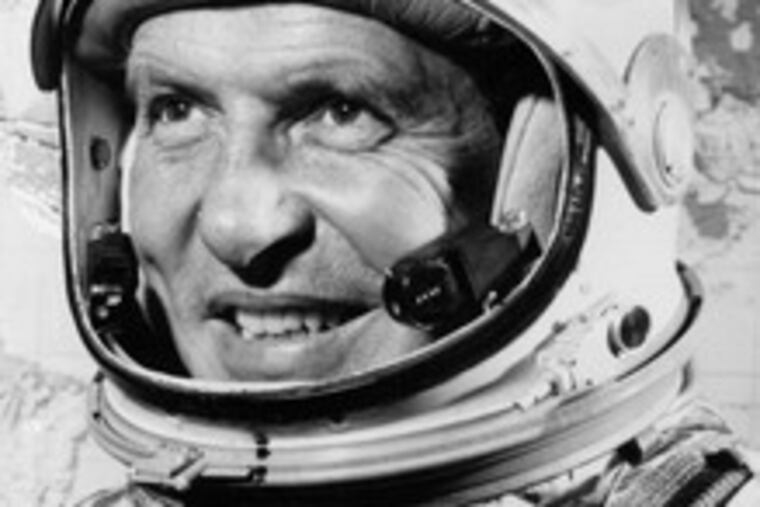Astronaut 'Wally' Schirra Jr., 84
Walter M. "Wally" Schirra Jr., 84, who followed his barnstorming parents into the sky as a Navy combat pilot and the only astronaut to fly in the Mercury, Gemini and Apollo space programs, died yesterday.

Walter M. "Wally" Schirra Jr., 84, who followed his barnstorming parents into the sky as a Navy combat pilot and the only astronaut to fly in the Mercury, Gemini and Apollo space programs, died yesterday.
Mr. Schirra died of a heart attack at Scripps Green Hospital in La Jolla, Calif., said Ruth Chandler Varonfakis, a longtime family friend and spokeswoman for the San Diego Air & Space Museum
"With the passing of Wally Schirra, we at NASA note with sorrow the loss of yet another of the pioneers of human space flight," NASA Administrator Michael Griffin said in a statement.
Mr. Schirra was one of America's seven original Project Mercury astronauts. On Oct. 3, 1962, he lifted off from Cape Canaveral in the Sigma 7 space capsule for the fifth U.S. manned space mission and third orbital flight.
Other than the temporary failure of a cooling system, his six-orbit flight went smoothly. Limiting maneuvering to conserve fuel, he splashed down on target in the Pacific less than four miles from the carrier Kearsarge. He pronounced himself "healthy as a bear" and "happy as a lark," according to NASA.
Mr. Schirra visited President John F. Kennedy at the White House and was awarded NASA's Distinguished Service Medal. Then-NASA Administrator James E. Webb told him: "No one has flown better than you."
In 1965, Mr. Schirra and astronaut Thomas P. Stafford were selected to fly the Gemini 6 mission, the first attempt to rendezvous in space with another orbiting spacecraft. After several postponements, they were launched Dec. 15, 1965. Mr. Schirra's assignment was to maneuver Gemini 6 close to the orbiting Gemini 7, which had been launched 11 days earlier and carried astronauts Frank Borman and James A. Lovell Jr.
Six hours after liftoff, Mr. Schirra brought Gemini 6 to within six to 10 feet of Gemini 7, close enough to see the other astronauts' faces.
"It was done to perfection," he said later. "Until then, we came in second to the Soviets. But they had never done a rendezvous, and they didn't do that kind of rendezvous for another 10 years."
Mr. Schirra brought Gemini 6 down in the Atlantic, near the waiting carrier Wasp. Gemini 7 landed two days later.
In October 1968, Mr. Schirra, Donn Eisele and Walter Cunningham orbited the Earth in Apollo 7. The flight went well, but all three astronauts came down with severe head colds. Mr. Schirra was the first person to take Actifed in space, much to the delight of its manufacturer, Burroughs Wellcome.
Mr. Schirra, who said he grew up knowing he would be a pilot, soloed at 16, and in 1942, the year after the United States entered World War II, he was accepted into an accelerated three-year course at the Naval Academy.
Graduated and commissioned in 1945, he was assigned to the cruiser Alaska, but the war ended before he got to his ship. A year later, before completing flight training at Pensacola, Fla., he married Josephine Cook Frasier. In 1949, Mr. Schirra was assigned to the 154th Fighter Bomber Squadron, flying low-level bombing and strafing runs over Korea. Rated an outstanding pilot, he was awarded the Distinguished Flying Cross and two Air Medals.
In 1959, he was selected as a Project Mercury astronaut. His responsibility, in addition to training for space flights, was the development and testing of the astronauts' life-support systems.
Mr. Schirra flew in space three times, once each during the Mercury, Gemini and Apollo programs.
In 1969, Mr. Schirra left NASA and the Navy. He became a commentator for CBS News and often teamed with Walter Cronkite on space coverage.
Schirra on Space
In an Associated Press interview in April, Walter Schirra reflected on what it meant to him to see Earth from space. He made the comments for an article on astronauts' views of Earth Day. Some excerpts:
"I was very impressed with
the fact that as I passed over India and China -
this was 1962 - clouds of dust and smoke covered both countries very, very extensively, where Africa
was fairly clear, which proved to me something was going wrong with the environment even then.
"The subsequent missions, particularly Apollo 7 [in 1968]. . . I saw the same cloud effects of dust, dirt and smoke increase immeasurably, to the
point where I become quite concerned about
the fact that man was making a mess out of
our environment.
"The result of it was I had a phrase that I should give you . . . 'I left Earth three times. I found no place else to go. Please take care of spaceship Earth.' "
"It's interesting because
we couldn't see the
borders of the different countries. I'm always amazed at how geopoliticians made
those borders - rulers meaning dictators, kings or politicians - and apparently we the humans have gone along with it."
SOURCE: Associated PressEndText
See NASA's tribute to Wally Schirra, with video and a photo gallery, at its Web site via http://go.philly.com/schirra EndText